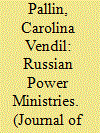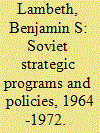| Srl | Item |
| 1 |
ID:
076796


|
|
|
| 2 |
ID:
076795


|
|
|
| 3 |
ID:
076793


|
|
|
|
|
| Publication |
2007.
|
| Summary/Abstract |
The frequent claim that the "power ministries," "siloviki" or "chekisty," decide just about everything in Russian politics and the tendency to demonize this sphere detract attention from the real problems. The power ministries are not a homogenous group and Putin would never give the FSB or any other institution the opportunity to "take over" Russian politics. Instead, the dilemma that faces the Kremlin and Russian society at large is the fact that the power ministries have never been subject to scrutiny. Incompetence, abuse of power and sheer inefficiency can thus thrive in this sector. Even more problematic is the Kremlin's compulsion to control everything - often with the help of the power ministries. This is, of course, damaging from a democratic perspective, but Putin ought to be concerned even from a purely Machiavellian point of view. By gathering all strings of control to the Kremlin, Putin has lost the alternative sources of scrutiny such as an independent press, judiciary and parliament.
|
|
|
|
|
|
|
|
|
|
|
|
|
|
|
|
| 4 |
ID:
076794


|
|
|
|
|
| Publication |
2007.
|
| Summary/Abstract |
This article was first written in 1976 as a classified RAND Corporation input into a major study that was commissioned by then-Secretary of Defense James R. Schlesinger to develop a comprehensive, all-source classified history of the Soviet-American strategic arms competition from 1945 to 1972. The intent of the original document was to outline the key internal and external factors that shaped the strategic policy choices of the Brezhnev regime, address the broad strategic objectives that guided those choices, consider the characteristics and deployment rationales of the third-generation ICBM programs that most visibly dominated them, and highlight the principal features of the force development style that they seemed to represent. The document was recently declassified by the Department of Defense and approved for public release in response to a request submitted to the Department under the Freedom of Information Act. It is being published now as it originally appeared, with only cursory editing for style and flow, in order to place the now-declassified document into the public domain as a retrospective account of an important chapter in the history of the cold war based on the best information that was available at the time it was written. Because any value it may have today as a contribution to knowledge about Soviet strategic activities during the cold war stems solely from the perspective that it offered at the time it was originally written, no attempt has been made to amplify or improve on its observations based on information and insights that have subsequently become available.
|
|
|
|
|
|
|
|
|
|
|
|
|
|
|
|